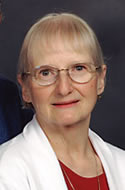Faithful Lines / Shirley Vogler Meister
Living with a curiosity about other faith traditions
 Since November 1996, I have often re-read a newspaper clipping I kept that refers to world religions. It was called “The Ann Landers Column,” which is a pseudonym for Esther Pauline “Eppie” Lederer.
Since November 1996, I have often re-read a newspaper clipping I kept that refers to world religions. It was called “The Ann Landers Column,” which is a pseudonym for Esther Pauline “Eppie” Lederer.
Although I am Catholic, I have always been curious about other faith traditions. When I enrolled at Indiana-Purdue University Indianapolis to finish my degree, I chose a class about the Bible and religion. Professor Paula Bowes and I became very good friends. She and her husband, Dr. James Bowes, a gynecologist, are also Catholic.
Eventually, they moved to Frederick, Maryland. My husband, Paul, and I visited them on our way home from a trip to donate historical material to the Holocaust Museum in Washington, D.C. Our box was filled with letters and other pertinent Holocaust-related material that had belonged to a German-Austrian couple in our first neighborhood in Indianapolis.
In a serendipitous manner, we inherited those documents from our Jewish neighbors, who were so dear to us. The Weisses would have loved the Ann Landers column that I saved. They were very open-minded about other faiths.
The Ann Landers column introduced her subject with this headline: “Do you have any idea when your religion was founded and by whom?”
As a Roman Catholic, I know the answer for my faith is: Through Jesus Christ, the Son of God and our Lord and Savior.
The Jewish faith was founded by Abraham about 4,000 years ago.
The religion of Hindus developed in India around 1500 B.C.
Buddhism split from Hinduism, and was founded by Buddha, Prince Siddhartha Gautama of India, about 500 B.C.
The prophet Mohammed began Islam around 600 AD in what is now Saudi Arabia.
The various Eastern Orthodox Churches faith separated from Roman Catholicism around 1000.
Martin Luther, an ex-Catholic friar, began the Lutheran faith in 1517.
King Henry VIII established the Church of England in 1534.
Presbyterianism was begun by John Knox, who brought John Calvin’s teachings to Scotland in 1560.
The Congregational tradition branched off from Puritanism in England in the early 1600s.
Baptists trace their history to John Smith, who launched this faith in Amsterdam in 1607.
John and Charles Wesley began Methodism in England in 1744.
The Church of Jesus Christ of Latter Day Saints (Mormons) was started by Joseph Smith in 1830 in upstate New York.
William Booth established the Salvation Army in London in 1865.
The Christian Science movement was started by Mary Baker Eddy in 1879.
Charles Taze Russell founded the Jehovah’s Witness in Pennsylvania in the 1870s.
Pentecostalism began in the United States in 1901.
If you are agnostic, you are skeptical of God or any higher being.
If you are an atheist, you don’t believe in God or any other power.
Although grateful to be Catholic, I’m always open to attending other churches for special reasons, but I’m also pleased when non-Catholics have done the same with our faith.
(Shirley Vogler Meister, a member of Christ the King Parish in Indianapolis, is a regular columnist for The Criterion.) †
 Since November 1996, I have often re-read a newspaper clipping I kept that refers to world religions. It was called “The Ann Landers Column,” which is a pseudonym for Esther Pauline “Eppie” Lederer.
Since November 1996, I have often re-read a newspaper clipping I kept that refers to world religions. It was called “The Ann Landers Column,” which is a pseudonym for Esther Pauline “Eppie” Lederer.